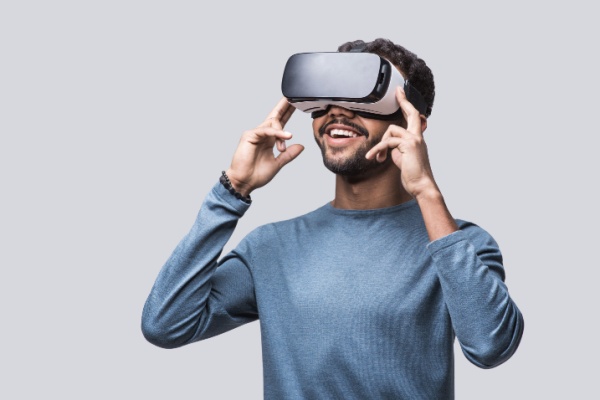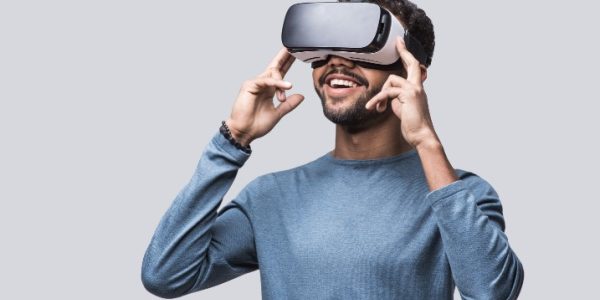
In the landscape of personal development, coaches are constantly seeking innovative tools and technologies to enhance their clients’ experiences and drive meaningful results. One such groundbreaking technology that has been gaining traction in recent years is virtual reality (VR).
By immersing clients in simulated environments, virtual reality offers a unique platform for coaches to engage them in transformative experiences, enabling them to unlock their full potential within safe and controlled settings that are limited only by their imagination.
To better understand the use of virtual reality in coaching, we spoke with Lucie Coudret, ACC, an ICF credentialed coach based in the United Kingdom. Lucie discusses the benefits and challenges of using virtual reality in her coaching practice.
International Coaching Federation (ICF): What does a virtual reality session look like in your coaching practice?
Lucie Coudret, ACC: I use virtual reality with coaching in two ways. One is in person, where we observe someone’s behavior in different virtual environments. The second is remote, where the client has their own headset, and we meet as avatars in a virtual environment. With in-person clients, we begin by spending 30 minutes immersed in virtual reality before engaging in a one-hour coaching session tailored to their virtual realm experiences. Typically, a client is exposed to six different environments. During this time, I assess different things like how they handle ambiguity, control or a lack of control, their responses to rewards or the lack thereof, and pressure in different situations.
I also look at their self-talk. as virtual reality immersion makes people forget that they’re being observed. This allows for an authentic and comprehensive exploration of the client’s mindset and behavior.
In remote virtual reality sessions, we both join a live environment as avatars, which allows for self-expression, and most importantly, a way to feel more present in 3D than on Zoom, as well as feeling safer through greater anonymity. We may explore different environments or engage in various exercises tailored to their needs.
ICF: What kind of virtual reality environments do you use for your coaching sessions?
Lucie: We incorporate a diverse range of environments, such as outer space, Rome, a laboratory, or a cabin in the woods. For the in-person experience, a guide leads the client through each environment for 30 minutes while the coach says nothing and simply observes.
The guide’s level of helpfulness varies on purpose. For example, while in a certain room, like the “Ambiguity Room,” a client’s questions are met with silence to see how they respond. They are left to navigate independently.
It’s important to note that there is no right or wrong response in these scenarios — there’s no evaluation. Rather, they serve as a diagnostic tool I use to understand different reactions to various of tasks and activities. I can then tailor the coaching session around what is revealed, with the aim of raising the client’s self-awareness.
In the coaching session, I will share observations of the client’s behavior and reactions, often surprising them. This helps them understand their behavior and its impact, especially in their work as a leader. There is no hiding or pretending once you step into virtual reality.
ICF: What are the benefits of using virtual reality in your coaching practice?
Lucie: Using virtual reality in coaching offers several significant benefits, one being the enhancement of a client’s ability to focus. When wearing the headset, they can’t see anything else, eliminating external stimuli. In this day and age, it’s extremely difficult to fully focus and be attentive.
When you’re in virtual reality, you’re fully immersed. The client may be standing in their living room, but once they put on the headset, they’re transported to a beach, complete with the sounds of the waves, birds, and trees moving in the wind. This immersive experience tricks the brain and fosters a heightened sense of focus.
If a client struggles with creativity, a calming environment like a beach can help them relax and encourage different thinking. Here, exercises with seashells where they talk about their strengths, or with coconuts where they shake them to reveal coaching questions, can stimulate creative thinking.
VR allows us to gain deeper insights and evoke higher awareness more quickly than we typically would in a Zoom call or in-person conversation. The intensity of the experience, such as your brain tricking you into thinking you are elsewhere, and the immersive nature helps the individual act authentically and say things that come to mind, leading to deeper insights.
We’ve also found that both younger generations and neurodiverse individuals feel safer and more comfortable opening up in virtual reality coaching sessions. The anonymity and engaging 3D nature make it feel safer. One client who was autistic felt more comfortable in that environment because of the calm and the less direct eye-contact through avatars.
ICF: What are some of the challenges of using VR in coaching?
Lucie: The primary challenge is the perceived accessibility of virtual reality headsets. I say perceived because they’re much cheaper now. You can now easily buy one first or second hand for under $200 USD, but this can still be expensive for some, as it’s not yet mainstream.
Many people I want to coach do not have a headset (e.g., women leaders). One option is to package it in a coaching offering or propose that they rent or borrow headsets.
More and more people, especially in the younger generation, are using virtual reality for gaming, so it is possible to borrow one. But it will remain a challenge until VR is more widely used.
ICF: What do you see for the future of using virtual reality in coaching?
Lucie: My vision for the future of virtual reality in coaching is a mix of what I see and what I hope. The new developments in headsets and software are promising, and as technology evolves, more people will have a headset.
Given the younger generation is being brought up with this technology, it is important to be prepared to coach future leaders using the technology they are familiar with, especially communicating remotely through utilizing avatars.
I envision a future where virtual coaching sessions are commonplace. I imagine a day when you and I talk through virtual reality, on a virtual beach or in the streets of Rome, having a conversation while physically apart, but feeling that presence through avatars. These advancements have the potential to revolutionize the coaching landscape by offering impactful experiences despite geographical distances.







